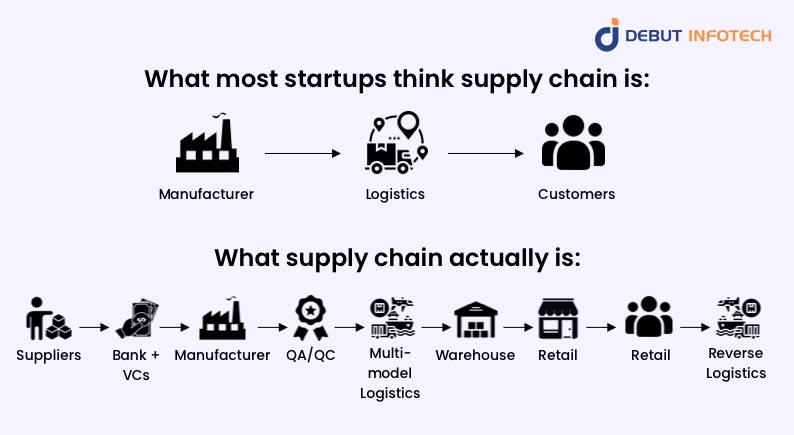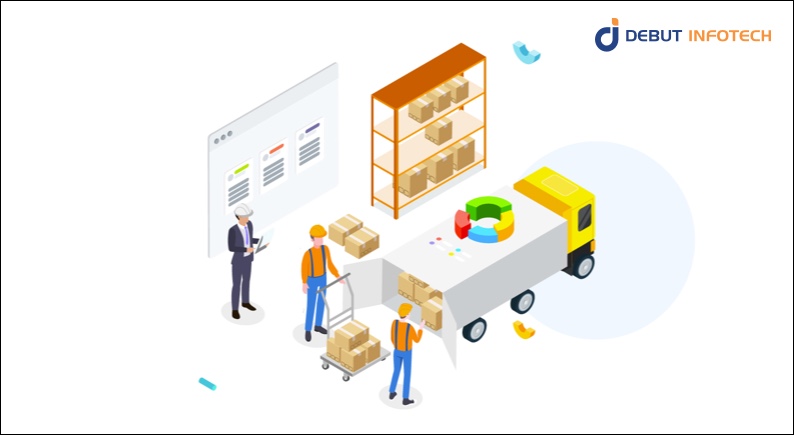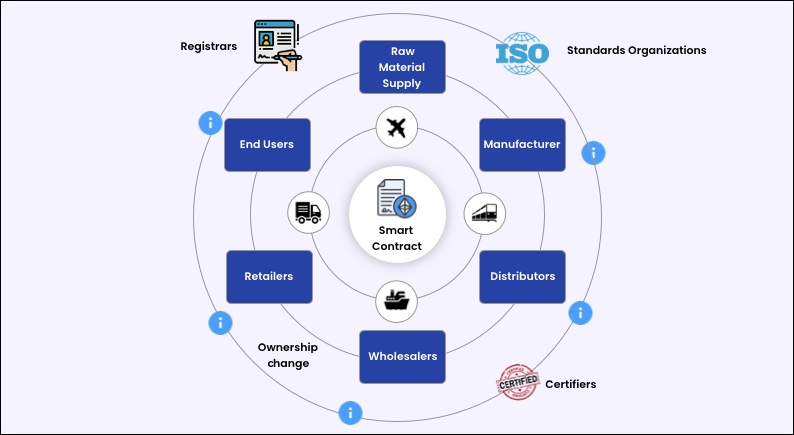Table of Contents
Home / Blog /
Top 20 Blockchain-Powered Supply Chain Startups
December 20, 2023

December 20, 2023
Let’s dive into the buzzing world of blockchain in supply chain management and why startups are the superstars here. Picture this: blockchain is like a digital ledger that’s super transparent and tamper-proof. In the supply chain, it’s a game-changer! It tracks goods from A to Z, ensuring everything’s legit and efficient. This tech is a big deal for startups, especially in hotspots like Bangalore or San Francisco.
Why are startups the heart of this revolution? Well, they’re agile, innovative, and unafraid to try new things – think 3PL startups or those focusing on AI in supply chains. They’re breaking new ground, from agriculture to healthcare supply chains, making things more sustainable and innovative. It’s not just about tracking; it’s about reimagining supply chains, even in places with 0 startup costs.
So, there you have it! Blockchain in supply chains? It is a match made in heaven, with startups leading the charge! Let’s discuss the top 20 blockchain supply chain startups.
Supply Chain Startups: Understanding Blockchain in Supply Chain
Let’s unpack blockchain in supply chain – it’s simpler and cooler than it sounds.

Imagine blockchain as a digital chain of blocks (hence the name!). Each block stores data like transactions, and once a block is filled, it’s locked and linked to the next. This creates a super-secure, unchangeable record – like a digital diary that can’t be tampered with.
Bring in the supply chain – think goods moving from manufacturers to stores.
Blockchain steps in as a trusty sidekick. It brings transparency, letting everyone track products from farm to shelf, a concept further elaborated in this insight on the role of blockchain in agriculture supply chain. No more guessing games about where your stuff comes from! Plus, it’s secure, so no worries about data tampering or fraud, which is a big deal for supply chain startups, especially in tech-heavy areas like Bangalore or the Bay Area.
Efficiency? Oh, it’s top-notch! Blockchain reduces paperwork, speeds up transactions, and cuts costs. It’s like giving the supply chain a super-speed boost! So, blockchain in supply chains? It’s all about trust, security, and making things run like a well-oiled machine.
Assess the Best Blockchain Startups in Supply Chain
Dive into detailed analyses of top blockchain-powered supply chain startups and their innovative solutions.
Top 20 Supply Chain Startups Using Blockchain
Here are our top picks for the best companies using blockchain in supply chain:
1. Yojee
Established in Singapore in 2016, Yojee is transforming logistics through its innovative SaaS platform, focusing on efficient land transport management and reducing carbon emissions. Integrating blockchain technology, they enhance operational transparency and efficiency, simplifying complex logistics processes and exemplifying their commitment to sustainable, eco-friendly transportation solutions.
2. Te-Food
In 2016, Te-Food emerged from Hungary with a vital mission: to bring unparalleled transparency to food logistics and safety. By leveraging blockchain technology, they offer real-time tracking and a detailed history of food products, from livestock to fresh produce. This approach has significantly elevated food safety standards, bolstering consumer trust and setting new benchmarks in traceability within the food industry.
3. T-Mining
Belgium’s T-Mining, also established in 2016, has carved a niche in maritime logistics. Their mission is to enhance the security and efficiency of maritime operations, particularly focusing on Secure Container Release. By integrating blockchain technology, T-Mining has transformed the way containers are handled in ports, ushering in a new era of security and operational effectiveness in the maritime sector. Their contributions have been pivotal in modernizing port logistics globally.
4. SukuSuku: Simplifying Web3 Integration
Founded in the United States in 2018, Suku is dedicated to accelerating Web3 adoption by creating a user-friendly ecosystem that enhances community connectivity. Their blockchain application streamlines the transition into Web3, simplifying the onboarding process and enriching digital community experiences. Suku stands out for making Web3 more accessible and interactive.
5. ZEGOFOOD: Championing Clean Eating
ZEGOFOOD, also based in the United States and established in 2012, is on a mission to offer clean, toxin-transparent food. They educate consumers about food purity, providing QR codes for transparency. By utilizing blockchain, ZEGOFOOD ensures traceable transparency in its food products, pioneering the realm of clean eating and consumer education.
6. OriginTrail: Innovating in Supply Chain Transparency
OriginTrail, from Slovenia and established in 2013, focuses on developing a blockchain-based protocol for decentralized trust in supply chains. Their application of blockchain significantly enhances data integrity and transparency in product supply chains, earning recognition for their innovative approach to supply chain integrity.
7. Peer Ledger: Advocating for Corporate Responsibility
Canada’s Peer Ledger, established in 2016, assists companies in improving human rights and environmental performance using blockchain. Their technology maintains data capabilities and situational awareness, contributing significantly to corporate social responsibility efforts.
8. Blockhead Technologies: Securing Industries with Blockchain
Established in 2018 in Australia, Blockhead Technologies provides secure and transparent SaaS solutions for the fuel and mining sectors. Their implementation of blockchain offers comprehensive, reliable data insights, making them a key player in enhancing data security and transparency in resource industries.
9. CargoCoin: Revolutionizing Global Trade and Transport
CargoCoin, launched in Bulgaria in 2017, aims to decentralize global trade and transport with smart contracts and cryptocurrency. Their use of blockchain in trade finance and transport marks a significant advancement in international trade and logistics.
10. CargoX: Pioneering in Blockchain Document Transfer
Slovenia’s CargoX, established in 2018, offers a Blockchain Document Transfer platform for the secure and instant transaction of documents. This innovative blockchain application for transferring and owning digital documents has made CargoX a notable name in logistics document handling.
11. Chronicled: Transforming Life Sciences with Blockchain
Chronicled, based in the United States and established in 2014, specializes in automating revenue management for the Life Sciences industry. They utilize blockchain technology to ensure the accuracy of drug pricing and transactions, significantly enhancing efficiency in pharmaceutical supply chain management.. Chronicled’s impact on this sector is marked by its contribution to improving operational precision and cost-effectiveness.
12. WAVE BL: Driving a Paperless Maritime World
Israel’s WAVE BL, founded in 2016, envisions a paperless world through its blockchain-based digital courier platform. The company uses blockchain to transfer Bills of Lading and other documents, pioneering efforts to reduce paperwork in maritime trade. This innovation is a step forward in modernizing and streamlining maritime logistics processes.
13. Morpheus.Network: Streamlining Global Supply Chains
In Canada, Morpheus. Network was established in 2017 to optimize and automate global supply chain operations. Implementing blockchain has streamlined supply chain processes, enhancing efficiency and reliability. Their achievements in supply chain management are a testament to the potential of blockchain in revolutionizing global logistics.
14. Konexial: Innovating Transportation Technology
Konexial, founded in 2017 in the United States, is committed to enhancing transportation profitability through advanced technological solutions. Integrating blockchain into telematics and AI-powered safety solutions, Konexial stands out for its innovation in transportation and logistics technology, driving improvements in efficiency and safety in the sector.
15. Grainchain: Advancing Agricultural Logistics
Established in 2013 in the United States, Grainchain’s mission is to automate tracking systems for agricultural commodities, ensuring data accuracy. They employ blockchain for precise accountability in agricultural yield measurements, transforming how agricultural logistics and data management are handled, marking a significant advancement in the agricultural sector.
16. OpenPort: Revolutionizing Logistics in Asia
Based in Hong Kong and established in 2015, OpenPort is dedicated to improving trucking and logistics efficiency in emerging Asian markets. Their blockchain-integrated AI-based platform is specifically designed to enhance logistics operations. OpenPort is particularly noted for successfully tackling the unique challenges of logistics efficiency in diverse and often complex market conditions.
17. Akiri: Enhancing Healthcare Data Security in the U.S.
Akiri, from the United States and established in 2017, is on a mission to facilitate the secure movement of information in the U.S. healthcare system. Leveraging blockchain technology, they ensure secure healthcare data exchange, a commitment that has earned support from the American Medical Association for its innovative approach in a critical sector.
18. BurstIQ: Pioneering in Health Data Management
Also from the United States, BurstIQ, founded in 2015, is one of the leading supply chain startups that manages sensitive human data while providing hyper-personalized digital experiences. Their use of blockchain for secure and personalized health data management has led to the development of the LifeGraph platform, significantly revolutionizing the approach to personalized health experiences.
19. Guardtime: Leading Cybersecurity with Blockchain
Guardtime, established in 2007 in Estonia, specializes in cybersecurity solutions across various industries. Their development of blockchain-based solutions has positioned them as a leader in enhanced cybersecurity, recognized for their extensive partnerships and innovative approaches to data security.
20. Shopping.io: Integrating Cryptocurrency with E-Commerce
From the United States and established in 2020, Shopping.io is at the forefront of enabling cryptocurrency shopping on major e-commerce platforms. They utilize blockchain to facilitate secure and versatile online shopping transactions, bridging the gap between cryptocurrency and mainstream online shopping and marking a significant milestone in integrating digital currency with e-commerce.
Read also this blog- Benefits of Blockchain in Food Supply Chain – Our Expert Insight.
Innovations in the Field
These trailblazing startups are introducing some seriously cool innovations in the bustling realm of supply chain startups. They’re not just tweaking the old ways but reinventing the game with tech-savvy flair and a splash of blockchain magic.
Take Yojee, for example. A leading blockchain supply chain startup uses a SaaS model to make freight movements slicker than ever. Imagine managing land transport with a few clicks and reducing carbon emissions simultaneously. It’s like giving logistics a green superpower!

Then Te-Food turns the food supply chain into a transparent journey. With their solution, tracking your apple back to its tree is no longer a mystery. It’s about knowing where your food comes from, farm to fork.
And let’s remember T-Mining. These folks are revolutionizing maritime logistics. With their blockchain-backed Secure Container Release system, losing a container at sea is about as likely as losing your coffee in your own hands.
The impact? Huge! Traditional supply chain processes, often bogged down by inefficiencies and opacity, are getting a major upgrade. These innovations bring transparency, speed, and security to the table. It’s like watching the supply chain startups wear a superhero cape and soar into the future.
So, what’s the takeaway? These supply chain startups aren’t just changing the supply chain; they’re propelling it into a new era of efficiency and trust. And in this fast-paced world, that’s awesome.
Challenges and Solutions
Navigating the world of supply chain innovation, especially with blockchain, presents a unique set of challenges. A primary hurdle is resistance to change. Traditional supply chain systems are deeply entrenched, and introducing new technology like blockchain often meets skepticism. To counter this, startups focus on educating stakeholders about the long-term benefits, such as enhanced transparency, security, and efficiency.
Another significant challenge is scalability. Blockchain solutions must be able to handle the vast amounts of data and transactions typical in supply chains. Startups often address this by designing scalable and adaptable platforms, ensuring they can grow with increasing demand.

The initial investment required for technology adoption can also be daunting. To alleviate this, startups might seek partnerships with established supply chain entities, sharing resources and expertise. This collaboration not only eases the financial burden but also accelerates integration and adoption.
The key to overcoming these challenges lies in persistent innovation, strategic partnerships, and a focus on education to foster a receptive environment for new technologies.
Future Outlook
The future outlook for blockchain in supply chain management is bright and transformative. Predictions suggest a significant shift toward more transparent, efficient, and secure supply chains, as explained in this detailed analysis. Blockchain technology is poised to revolutionize traditional practices, enabling real-time tracking, reducing fraud, and enhancing collaboration across global networks.
The impact of these startups is expected to be substantial, potentially setting new standards in supply chain operations. Industries from agriculture to healthcare could dramatically improve operational efficiency and data integrity. Blockchain will likely become an integral component of future supply chain solutions, driving innovation and sustainability in the sector.
Ready to Transform Your Supply Chain with Blockchain?
Partner with Debut Infotech to implement customized blockchain solutions tailored to your business needs.
Conclusion
Blockchain’s potential in revolutionizing supply chain management is immense, offering unparalleled transparency, security, and efficiency. Startups are at the forefront of this innovation, adapting to the changing landscape and actively shaping it. Their pioneering solutions are setting new standards, heralding a future of more resilient and agile supply chains.
FAQs
A: A supply chain startup is a company that specializes in using innovative technologies and solutions to improve various aspects of supply chain management. These startups focus on optimizing the flow of goods, information, and finances within the supply chain to make it more efficient, transparent, and cost-effective.
A: The blockchain app development cost depends on several key factors, including the specific features and modules you wish to incorporate in the MVP, the choice between a private or public blockchain, and the intricacies of deployment infrastructure. This cost can range significantly, typically from approximately $15,000 to several million dollars.
A: Several companies are using blockchain in their supply chain operations, including:
– Walmart: Enhancing food safety by tracking product sources.
– IBM Food Trust: Creating a transparent and traceable food supply chain.
– Maersk and IBM TradeLens: Improving global shipping and trade processes.
– De Beers: Tracing the origin of diamonds to prevent conflict diamonds.
– Everledger: Using blockchain to track the provenance of luxury goods.
A: Blockchain benefits supply chain startups by enhancing transparency, traceability, security, and efficiency while reducing costs.
A: To set up a supply chain startup using blockchain, follow these steps:
1. Identify a niche.
2. Research the market.
3. Choose blockchain technology.
4. Develop partnerships.
5. Create a tailored solution.
6. Test and validate.
7. Ensure regulatory compliance.
8. Launch and market.
9. Scale your operations.
Talk With Our Expert
Our Latest Insights
USA
2102 Linden LN, Palatine, IL 60067
+1-708-515-4004
info@debutinfotech.com
UK
Debut Infotech Pvt Ltd
7 Pound Close, Yarnton, Oxfordshire, OX51QG
+44-770-304-0079
info@debutinfotech.com
Canada
Debut Infotech Pvt Ltd
326 Parkvale Drive, Kitchener, ON N2R1Y7
+1-708-515-4004
info@debutinfotech.com
INDIA
Debut Infotech Pvt Ltd
Sector 101-A, Plot No: I-42, IT City Rd, JLPL Industrial Area, Mohali, PB 140306
9888402396
info@debutinfotech.com




Leave a Comment